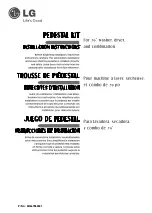
Praxair’s ControLyo™ Nucleation On-Demand
Technology
FTS Systems LyoStar™ 3
52
Rev 006, 01/14
© SP Scientific 2014
Mechanism
The exact mechanism by which Praxair’s ControLyo™ Nucleation On-Demand
Technology induces nucleation is not fully understood, but there are hypotheses as to
what may give rise to nucleation. The gas in the product chamber undergoing
expansion during depressurization will cool, and the cold gas contacting the surface of
the metastable liquid in the vial might induce nucleation. Another hypothesis is that
depressurization may cause local evaporation of some surface liquid, and the
resultant evaporative cooling may trigger nucleation. Another possibility is that sudden
depressurization may generate a pressure wave or vibrational disturbance that
mechanically induces nucleation. Other mechanisms may be envisioned, and multiple
mechanisms may contribute to the successful control over the initiation of nucleation.
The mechanism remains speculative, though, and additional research is needed.
Guidelines and Performance Expectations
The target nucleation temperature should be a few degrees (usually 1 or 2 °C) below
the thermodynamic freezing point of the formulation to accommodate potential
inaccuracies in product temperature measurement or estimation. Therefore, the
freezing point should be accurately determined experimentally prior to lyophilization
with analytical methods such as DSC (differential scanning calorimetry) or FDM
(freeze-drying microscopy).
The efficacy of ControLyo™ technology generally improves with the following:
Increasing magnitude and rate of the pressure drop.
•
Use of argon gas instead of nitrogen gas.
•
Colder target nucleation temperature.
•
Larger product container size.
•
Lower fill volume.
•
The ControLyo™ technology is designed for a given lyophilizer’s pressure rating and
available depressurization orifices to provide effective nucleation control for as wide a
range of nucleation temperatures, container sizes, fill volumes, and gas types as
possible. If a lyophilizer can accommodate a sufficiently large and rapid pressure
drop, the ControLyo™ technology can controllably induce nucleation in all product
containers and fill volumes of practical interest for lyophilization using nitrogen gas at
temperatures within 1
°
C of a formulation’s thermodynamic freezing point (
i.e.
, the
typical measurement capability of a thermocouple). If the ControLyo™ technology
cannot achieve uniform nucleation control in a difficult application (
e.g.
, 1.5 mL fill in a
2 mL vial) using nitrogen gas at a temperature close to the formulation’s
thermodynamic freezing point, it may be necessary to decrease the target nucleation
temperature or use argon gas instead of nitrogen gas to achieve nucleation control.
Summary of Contents for LYOSTAR 3
Page 2: ......
Page 6: ...iv Rev 006 01 14 SP Scientific 2014...
Page 10: ...Contents FTS Systems LyoStar 3 viii Rev 006 01 14 SP Scientific 2014...
Page 18: ...Getting Started FTS Systems LyoStar 3 8 Rev 006 01 14 SP Scientific 2014...
Page 30: ...Operating your Lyophilizer FTS Systems LyoStar 3 20 Rev 006 01 14 SP Scientific 2014...
Page 36: ...Liquid Nitrogen Trap FTS Systems LyoStar 3 26 Rev 006 01 14 SP Scientific 2014...
Page 48: ...Sample Extractor Assemblies FTS Systems LyoStar 3 38 Rev 006 01 14 SP Scientific 2014...
Page 52: ...Stoppering FTS Systems LyoStar 3 42 Rev 006 01 14 SP Scientific 2014...
Page 56: ...Shelf Latching FTS Systems LyoStar 3 46 Rev 006 01 14 SP Scientific 2014...
Page 74: ...Appendix A Sample Recipe FTS Systems LyoStar 3 64 Rev 006 01 14 SP Scientific 2014...
Page 80: ...Appendix C Stainless Steel Cleaners FTS Systems LyoStar 3 70 Rev 006 01 14 SP Scientific 2014...
Page 81: ......
















































